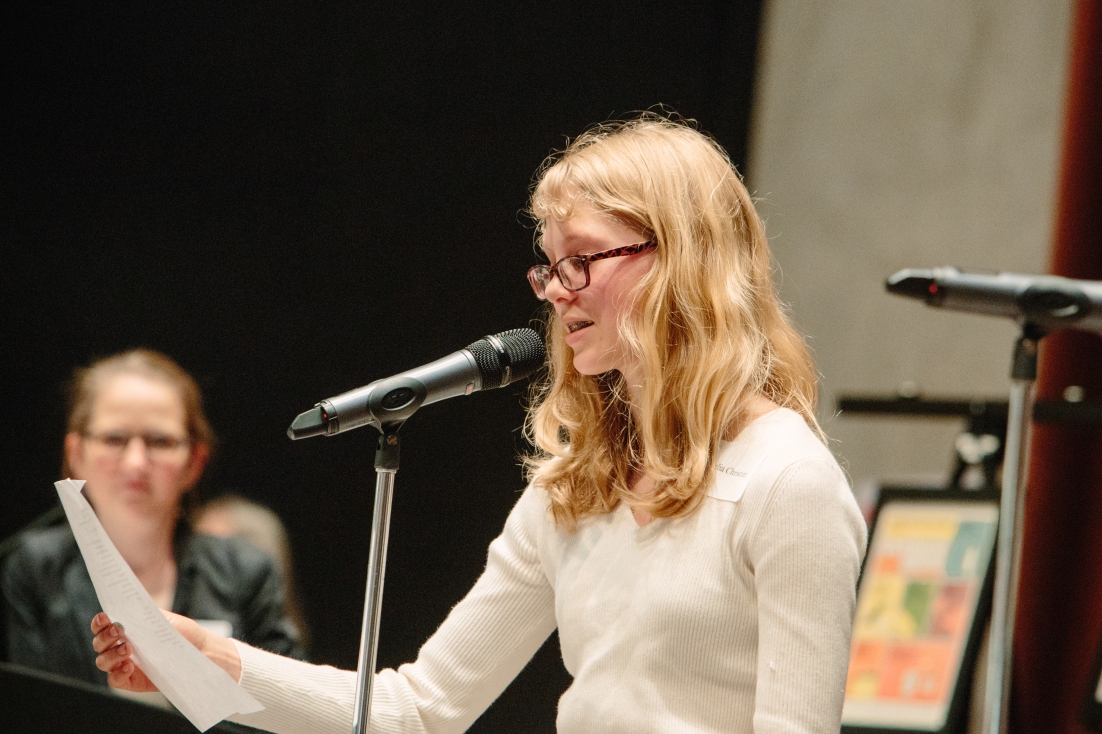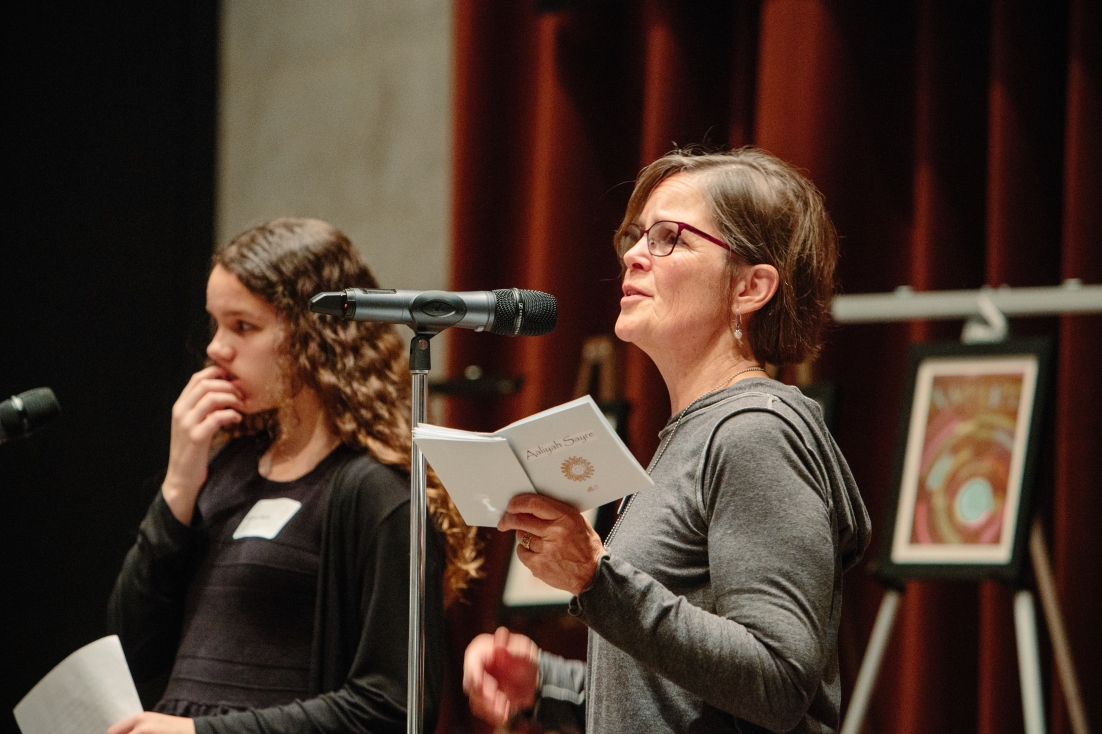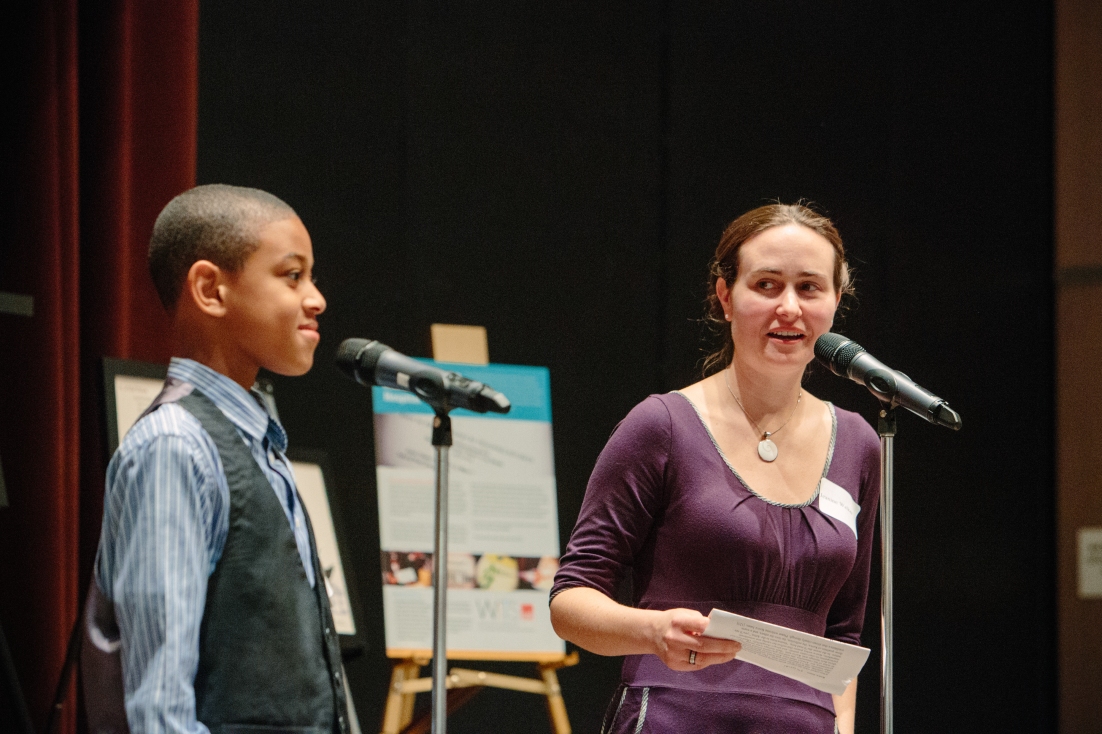
Introductions: Imagination into Ink, Part 1
June 14, 2016
Paired with images from May 25th, the first night of our 2016 WITS Year-End Readings, these are just a few of the extraordinary introductions our writers-in-residence have written for their students, giving us insight into how WITS students view the world, themselves, and their writing. To get a glimpse inside these moving and collaborative relationships, read on!
WITS Writer Laura Gamache introduces Patrick Jaramillo, Cordelia Christian, and Aaliyah Sayre

Patrick Jaramillo comes to us this evening from the far north: Port Townsend, where he is a seventh grader at Blue Heron School. He likes the word beta for the way it sounds, and equinox because it’s a fun word to say. His poem confirms his love of language: thought thumps, and trembles. The Hero of Breath has no vengeance in his vocabulary. He rocks the poem title: I’d put “Black Hole and the Bleeding Heart” and tonight’s “Past, Present and the Golden Apple” right up there with one of Dean Young’s. And he’s kinda nice to be around.

Cordelia Christian likes birds. One of her favorite words is pneumatization, which she told me means the process of being hollowed out, like bird bones are pneumatized. Last year, when Cordelia was a fifth grader at TOPS K-8, she wrote about wanting to “dance with the breeze, not hampered by the need for wings,” and tonight’s poem has wings in it too. The title for tonight’s poem, “HemlockWing,” was inspired by the names in the cat warrior books series she’s reading. HemlockWing opens in the voice of a bird, then changes point of view to a human’s. Cordelia asks that you not take this poem literally.

Aaliyah Sayre has a lot of favorite words. Yesterday, she told me she likes the word marionette because it just sounds good to her ears. Whenever Aaliyah shared her work in Sarah Erb’s 6th grade class last fall at Hamilton, I felt as though the flow was emerging, not from the paper she held, but from an urgent creative spark that was flying out from her that very minute. In class, I shared the story of ancient inventor Daedalus, his son Icarus, and their attempted flight. When Aaliyah met Icarus, she identified immediately. Listen for how she has Icarus thread a raven feather into his wing for good luck.
WITS Writer Jeanine Walker introduces Keiva Jones, Jackson Merriweather, Julian Quian, and Lola Rodriguez

When asked what she enjoys about writing poetry, Keiva Jones said, “It’s fun, calming, and active at the same time.” This appreciation mirrors her other interests: she’s a dancer, jazz and ballet, and practices art and gymnastics, too. Always observant, Keiva notices those around her. She and so many of her classmates, she told me, gravitated toward writing poems about their feelings and, Keiva said, “Their feelings were strong.” Her participation in class came quietly, and always thoughtfully. Observant and empathetic, Keiva writes poems that reflect her caring and considerate nature. In the poem she’ll read here, “Instructions to the Artist,” you’ll see those qualities of Keiva: the reflection, the love for others, and a warm confidence that shines clearly through.

Jackson Merriweather told me, “I surprised myself with all the poems I made.” He may have surprised himself, but I was on to him early on—and when he reads his poem about being inside the letter M, you’ll see why. Inventive, curious, and with a great sense of humor, Jackson approached each week’s assignments with an open heart and a true enthusiasm that I really welcomed as a visiting teacher. He loves bike riding and playing the trombone, and you’ll do well to envision a bicycle and a trombone when you hear this poem, which takes us inside the alphabet in a way I find entirely delightful, moving fast down a hill and sliding right on up the next one.

The work that Julian Quian will share with you tonight came from the first lesson on the first day I taught this year, and this poem alone made me so happy to be back in the classroom as a teaching artist. I appreciate how Julian’s voice is at once certain and humble. He loves soccer, and reflection on being a defender, he told me, “I don’t need to score the goals as long as I’m helping other people. Wherever coach needs me, I’m good with that.” I felt that same openness and willingness in his poetry each week, and this is exemplified in this poem about his name. Into this piece, Julian brings so many perspectives, and you’ll hear the quiet confidence with which Julian Quian moves through the world.

Lola Rodriguez is a deliberate thinker, a deliberate writer. When I told her how creative I find her to be, she said she wasn’t sure what that meant, when it came to her—she described being, at times, “too close to a moment,” rendered unable to think at all. I can understand this. Her arts, which encompass an extensive comic-making enterprise and a love of creative writing, can overwhelm any mind when the ideas come all at once. Philosophical to the core, Lola raises questions and proposes answers in her writing that make me think and feel something brand new every time. I loved seeing how Lola used words to craft her thoughts into poetry, and I am excited for you all to hear her mind on the page today.
WITS Writer Clare Meeker introduces Natalie Duggan

Natalie loves to write – “sometimes,” she reminds me. And when she writes, she thinks in whole stories. Her hero story stood out from the 75 other third graders at Whittier elementary for its strong main character and plot, its humorous dialogue and carefully chosen details, like: “Lilly had a blue calico dress with pink tights and black shoes.” Natalie says she gets her “literal” sense of humor from her father and her love of horseback-riding from her mother. It is my pleasure to introduce you to Natalie Duggan!
WITS Writer Vicky Edmonds introduces Elijah Nathenson and McKenna Rice

McKenna Rice is like a hummingbird,
sometimes as soft as a whisper
and other times fierce and fast and you can barely see her moving,
but she carries beautiful kind of magic in her.
She is only 8 years old,
but she writes about subtleties many adults
barely notice.
She says writing her feelings helps her calm down,
that it feels like when she’s swimming
and she gets to go under water for a moment
and she feels free.
She loves her family,
and red velvet cupcakes,
and her dolls, Grace and Samantha,
and her best friend Lorelei.
She’s like a hummingbird that can flash her colors
or keep them hidden,
and tonight we are lucky to have her
share them with us.

Elijah Nathenson writes about being part of a tree,
but to me he is more like a silver stream
running through that forest.
He carries a kind of water
that washes away everything but the truth,
and then flowers of earnestness grow
in the ground he leaves behind him.
He is 11 years old,
and says writing poetry feels like relief,
like you’ve been lost forever
and someone has finally found you.
He is a deep and thoughtful and kind person,
and says he wants to be the kind of person that helps others.
His words help me
every time I get to hear them.
I’m so grateful I got to be in the place
this stream was running through…
WITS Writer Corinne Manning introduces Alex Brockman and Olivia Bernard

Have you heard of the term bonarding? It’s coined after the impressionist painter Bonard who used to keep brushes and paints in his pockets so that he could fix his paintings and sometimes that meant he would be fixing his paintings that were on the gallery walls or in his friend’s home. So bonarding is a term that means endlessly adjusting a creation even once it’s been deemed complete. Alex Brockman is the kind of writer who is endlessly bonarding. When we met to practice last week I said, “Don’t edit! don’t make changes.” But I understand Alex’s desire to do this—when you are a writer who is so in touch with the act and the magic of creation like Alex is, your work is always alive to you, always breathing and shifting. It’s fitting that we get to hear Alex read his magical realism story “The Paper.”

One afternoon in late March, I met with the writer Olivia Bernard. Though our intention was to discuss her short story “Hunger,” we found ourselves in deeper conversations about the nature of writing. Olivia has written four novels and though she excels at the short story, shared that she prefers the novel because “with a novel, you have more time for change to happen, for things to evolve.” I asked her for advice on writing, and she shared her experience: “I just start writing. I wing it until I feel like I need a plot.” No big deal. Olivia is a writer with clear sight into the workings of our world, and as a result, the workings of a story. Olivia wields her sight into fiction to help us see more clearly.
WITS Writer Sierra Nelson introduces Daniel Rapada

The first time I worked with Daniel Rapada at Seattle Children’s Hospital, he was working on a drawing of a special memory he had of going hunting with his dad. He drew himself and his dad, but he wasn’t sure how to draw the elk—and we talked about ways that writing could help fill in a picture, drawing our attention to certain bright details, the visible and invisible.
So Daniel wrote the scene in words too, and as the story unfolded he and his mom spoke of the importance of food to the different sides of Daniel’s family tree, with Filipino and Swinomish Tribe roots—which lead to the idea that the poem could exist in the Lushootseed language too, and a new antler grew.
Daniel’s poem was selected for this year’s Letterpress Project, a beautiful collaboration between our young WITS poets at Seattle Children’s Hospital and a group of professional letterpress artists at the School of Visual Concepts who design and hand-print these unique broadsides for the poets and their families. Juliet Shen is the artist who designed Daniel’s letterpress broadside, including both the English the Lushootseed.
WITS Writer Kathleen Flenniken introduces Henry Smith and Maha Al-Isa

It’s been a joy working with Henry Smith in third, fourth, and fifth grade, and watching him grow as a writer (and a boy!). He has a way of unabashedly announcing, “I love poetry!” that makes me love poetry all over again and, honestly, spreads excitement across the whole class. That joy was in everything Henry wrote this year. This poem, about books, gives you a sense of his inquisitive mind, his openness to all the shades of light and dark, and his ear for a beautiful phrase. “Books” is based on a poem called “Stone,” in which the poet Charles Simic imagines what it would be like to go inside a stone. Here is poet Henry Smith, going inside a book.

This was my first year working with fifth-grader Maha Al-Isa. I noticed her right away—her warmth and intelligence, her beautiful way of being present in our lesson, and her sense of humor, even when she might feel that day as though the world is conspiing against her. And I noticed her irresistible poems. Maha told me she loves poetry because it lets her “escape from the real world,” because “it gets out what [she’s] thinking” and that “it’s a beautiful way to connect with people.” In her poem tonight, you’ll feel Maha using the wonderfully-selected details of her dreams and everyday-sometimes-frustrating life to connect with you. Please enjoy Maha Al-Isa reading “You Can If I Can.”
Thanks to our writers-in-residence for all the work you do! Check out intros from the second night of student readings here.